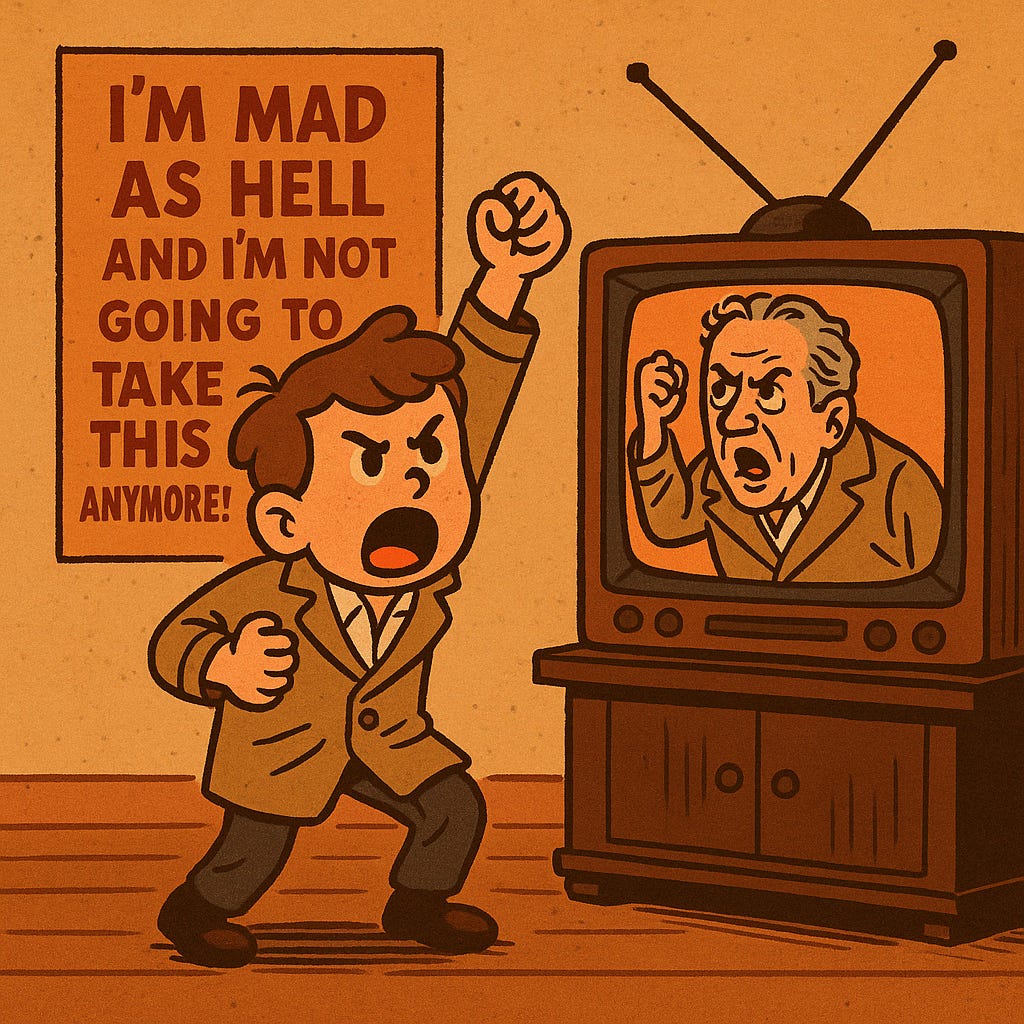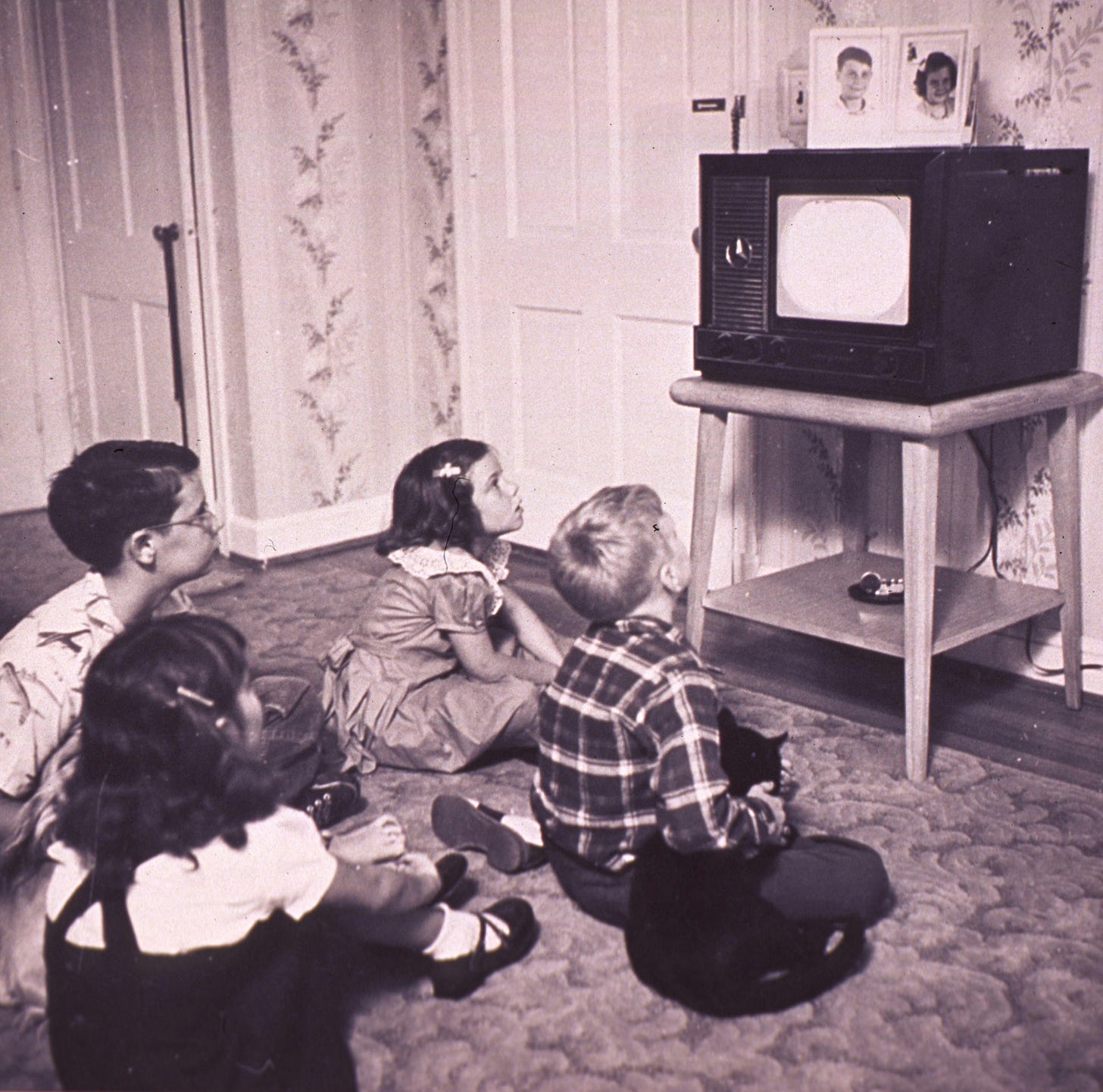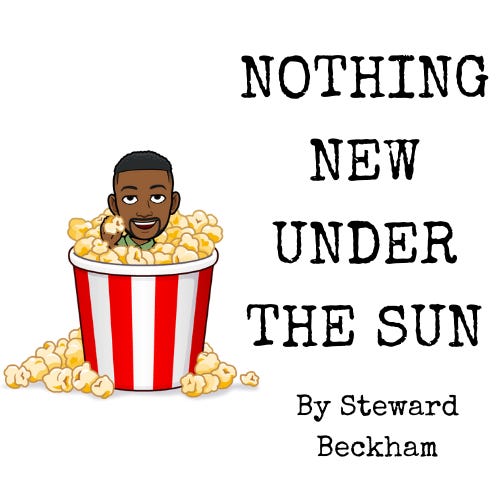
The Film
Network (1976), directed by Sidney Lumet, is one of those films that doesn’t age; it ferments. What began as a satire about the excesses of American television now plays like a prophecy. The story centers on UBS, a fictional news network modeled after the Big Three: NBC, CBS, and ABC.
Peter Finch (in his final role) stars as Howard Beale, a once-revered news anchor in the mold of Walter Cronkite. But he’s unraveling. His wife has died, ratings are tanking, and UBS has been taken over by a corporate titan: CCA, a faceless conglomerate that couldn’t care less about journalism’s soul. In this climate, Beale is unceremoniously fired by his friend and boss, Max Schumacher, played by William Holden, one of the last true believers in news as a public trust.
In protest, Beale tells his audience he plans to kill himself live on air. The announcement causes a stir, but not the kind that brings reflection or concern. Instead, it's a ratings spike. Max, momentarily sympathetic, lets Beale return for one final goodbye, but Beale launches into a surreal rant about running out of bullshit. What follows is a slow-motion media apocalypse, orchestrated by a new generation led by Diana Christensen, UBS’s programming chief, brilliantly played by Faye Dunaway.
Robert Duvall plays Frank Hackett, the ruthless corporate hatchet man from CCA who consolidates power behind the scenes, calling the network a “whorehouse” in one memorable line, and meaning it as a compliment. Meanwhile, Diana spins Beale’s breakdown into a nightly spectacle, complete with televangelist-style sets and revolutionary cosplay.
Max, now obsolete, begins an affair with Diana, only to realize she’s incapable of love. Her entire worldview is constructed from television scripts. “You are television incarnate,” he tells her in the film’s thesis line. “Indifferent to suffering. Insensitive to joy.”
The climax is as chilling as it is prophetic. When Beale begins denouncing a UBS deal with Saudi investors on air, his keepers panic. However, the top executive, Arthur Jensen, played with mesmerizing intensity by Ned Beatty, has a vision. He delivers one of the most iconic monologues in film history:
“There are no nations. There is no democracy. There is only IBM, and ITT, and AT&T, and DuPont...”
Howard is now a corporate prophet: protected until he becomes a liability. When his message begins to bite the hand that feeds, Jensen’s disciples arrange for his murder on live television. The film closes with a montage of ads and news bulletins announcing Beale’s death: “the first known instance of a man who was killed because he had lousy ratings.”
The Allegory
What makes Network haunting is how eerily it predicts our current landscape. Not just in form—though cable news, influencer theatrics, and algorithmic outrage culture all echo its plot—but in spirit.
The line about Diana learning everything she knows from Bugs Bunny isn’t just a jab—it’s a diagnosis. The screen raised her. Her soul, and the nation’s, was shaped not by experience but by programming. Television, in Network, is no longer just a medium. It is the medium through which all emotion, belief, and meaning are filtered, distorted, and sold.
The film isn’t just a critique of media sensationalism—it’s a eulogy for a public that once believed truth could be televised.
Personal Reflections from the Void
When I worked as a media monitor at Media Matters, Network lived in the background of my mind, but I didn’t fully grasp its resonance. Day after day, I watched cable news manipulate narratives, platform misinformation, and flail in the face of right-wing disinformation with the helplessness of Charlie Brown charging at Lucy’s football.
The first Trump years weren’t just politically traumatic; they were spiritually exhausting. I was processing the collapse of my family structure, the disintegration of public health, and the slow-motion implosion of institutions I once admired, all while earning, of all subject matters, a Master’s in Political Communication. Every day felt like living inside a recursive loop of crisis and spectacle.
It was then that I truly began to understand what Network was saying.
Howard Beale screamed, “I’m mad as hell and I’m not going to take it anymore!”
But America just watched. And then changed the channel.
The Age of the Boredom-Killing Business
What Network shows us, better than any white paper ever could, is what happens when a society trades depth for dopamine. When a citizenry, emotionally flattened by screens, stops being able to tell the difference between feeling and stimulation. Between truth and performance. Between nationhood and a Nielsen rating.
We are living in that aftermath.
We are the nation that shrugs at pandemics, at insurrections, at rising authoritarianism…because the noise has made reality feel fictional and fiction feel safe. And even those who know better, who remember a time of better journalism and better faith, are often stuck trying to make the old scripts work in a show that has long since jumped the shark.
In the end, Howard Beale did kill himself on television—just not in the way he expected. And maybe, in some way, we all did.









Outstanding you get to the heart of it all. I vividly remember the show when it showed. Made quite an impression on me. I know that you didn't, you must have watched it CD or Youtube.
Your review and analysis is absolutely spot on. And yes, it is not only prophetic, true then, but worse now with cable, Tic Toc, Xitter, Reddit, etc.